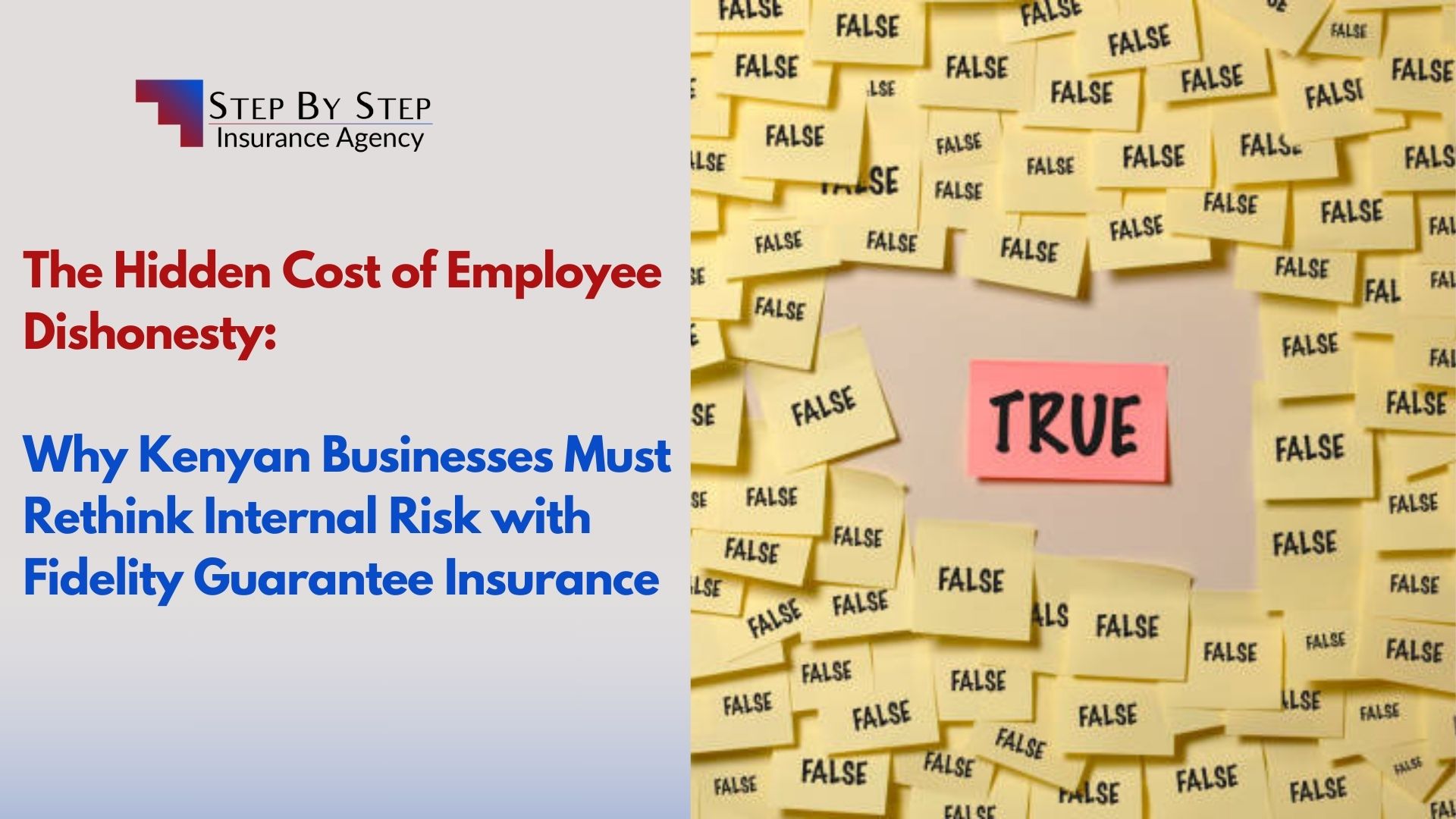The Hidden Cost of Employee Dishonesty: Why Kenyan Businesses Must Rethink Internal Risk with Fidelity Guarantee Insurance
Introduction
In Kenya, most businesses operate on trust. Employers believe in their staff, managers rely on their teams, and directors trust their department heads to do the right thing. But what happens when that trust is betrayed? For many businesses across Nairobi, Kisumu, Mombasa, and even rural counties, internal fraud is one of the most underestimated risks in business operations today. Whether you’re a CEO running a tech startup in Kilimani, a SACCO chairperson in Meru, or a hardware shop owner in Kitengela, your employees are both your greatest asset and potentially your greatest risk.

Fidelity Guarantee Insurance is one of the least talked about yet most critical insurance covers in Kenya. It protects businesses against financial loss caused by the dishonest or fraudulent actions of employees. While many firms invest in fire, theft, and vehicle insurance, very few think about internal threats, until it’s too late. According to local business audits and reports, some firms lose millions of shillings annually due to unchecked employee fraud, including theft, falsified records, fake suppliers, and embezzlement.
This article explores the true cost of employee dishonesty, breaks down how Fidelity Guarantee Insurance works, and highlights the role of Step By Step Insurance Agency in helping Kenyan businesses stay protected from within.
Key Takeaways
- Employee dishonesty is one of the most damaging and under-addressed risks in Kenyan businesses.
- Fidelity Guarantee Insurance protects businesses from internal theft and fraud.
- Kenyan companies lose millions annually from staff fraud—most of which is preventable.
- Must-haves include comprehensive cover for all finance-handling employees.
- Step By Step Insurance Agency offers expert guidance and access to top insurance providers.
Table of Contents
- Introduction
- What Is Fidelity Guarantee Insurance?
- Why Employee Dishonesty Is a Silent Killer in Kenyan Businesses
- Common Forms of Internal Fraud in Kenya
- Real Financial Impact of Employee Dishonesty
- Fidelity Guarantee Insurance Must-Haves
- Fidelity Guarantee Insurance Should-Haves
- The Role of Step By Step Insurance Agency in Risk Protection
- Conclusion: Protecting Trust, Preserving Business
What Is Fidelity Guarantee Insurance?
Fidelity Guarantee Insurance is a business insurance product that covers the employer against financial losses resulting from acts of fraud, theft, or dishonesty committed by an employee. It is specifically designed to address internal threats, unlike burglary or commercial property insurance which focuses on external risks.
This insurance is particularly essential in businesses where employees handle cash, inventory, financial records, or sensitive operations—like cashiers, procurement officers, accountants, or branch managers.
There are three main ways this cover can be arranged:
Named Policy:
Covers specific employees named in the policy (ideal for high-risk roles).
Position Policy:
Covers employees by their job position rather than by name.
Blanket Policy:
Covers all employees in a business (best for large companies or SACCOs).
Why Employee Dishonesty Is a Silent Killer in Kenyan Businesses
Unlike break-ins or accidents, employee dishonesty is often invisible, continuous, and calculated. Fraudulent actions can go on for months or even years before being discovered. By the time the loss is detected, the financial damage is often substantial—and recovery, difficult.
In Kenya, internal fraud is driven by:
- Weak internal controls in SMEs and SACCOs.
- Lack of proper audits.
- Cultural fear of accusing or prosecuting employees.
- Digital exposure, especially in finance or e-commerce firms.
Many employees use insider knowledge to bypass checks and balances, manipulate data, or even collude with external partners. The impact isn’t just financial. It erodes trust, affects staff morale, disrupts operations, and damages the company’s reputation.
Common Forms of Internal Fraud in Kenya
Fraud doesn’t always come with a mask and a break-in. Sometimes, it comes with a smile, a uniform, and an access card.

In Kenya, internal fraud is often an invisible leak—slow, quiet, and devastating. It creeps into payroll systems, stock records, delivery logs, and procurement deals, usually orchestrated by people you trust most: your employees. From fast-growing SMEs in Nairobi’s Industrial Area to established SACCOs in counties like Nyeri or Kakamega, the pattern is the same—someone on the inside finds a loophole, and money starts disappearing.
What makes internal fraud particularly dangerous is its familiarity. Unlike an outsider, an insider understands your weak points—your systems, your habits, and even your oversight style. They know how to stay below the radar.
To fight back effectively, business owners must first recognize the most common forms of employee dishonesty affecting Kenyan businesses today. Let’s break them down so you know what to watch for:
Theft of Cash or Inventory
Cashiers, store managers, or field agents sometimes under report sales or misappropriate daily collections.
Falsification of Accounts
An accountant or finance officer may alter records to hide fraud or siphon money to personal accounts.
Ghost Workers
Common in NGOs and large organizations. Salaries are paid to fake employees, and the fraudster collects the money.
False Procurement
Procurement officers may work with suppliers to inflate prices, approve fake deliveries, or receive kickbacks.
IT Fraud
Tech-savvy employees manipulate systems or customer databases to commit fraud—especially in fintech or digital lending platforms.
Real Financial Impact of Employee Dishonesty
Let’s look at examples of real damage caused by internal fraud:
A hardware store in Kitengela lost Ksh 2.4 million in stock over 10 months due to a supervisor colluding with suppliers.
A SACCO in Kiambu had over Ksh 15 million embezzled through fake loan disbursements, only discovered during a forensic audit.
A distribution company in Nairobi experienced Ksh 3 million in lost revenue due to a salesman creating fake receipts and redirecting payments.
These losses can:
- Cripple cash flow.
- Disqualify companies from tenders.
- Trigger loan defaults.
- Result in regulatory penalties.
Having Fidelity Guarantee Insurance doesn’t just reimburse losses; it allows companies to remain operational after fraud hits.
Fidelity Guarantee Insurance Must-Haves
When it comes to protecting your business from the inside out, Fidelity Guarantee Insurance is not just a nice-to-have—it’s a necessity. But not all policies are created equal, and overlooking key components could leave dangerous gaps that cost you millions.
Kenyan businesses today are exposed to sophisticated internal fraud schemes that can cripple operations, damage reputations, and drain cash flow. Whether you’re running a micro-enterprise in Gikomba, a manufacturing firm in Thika, or a SACCO in Kisii, having the right structure, scope, and support in your fidelity cover is non-negotiable.
These Must-Haves are the foundational features every business should insist on when buying Fidelity Guarantee Insurance. They ensure that your policy responds effectively when fraud strikes—and that your financial recovery is swift, fair, and complete.
Here’s what every well-protected Kenyan business should include in their cover:

Comprehensive Cover for All Financial Roles
Every business with a cashier, accountant, or procurement officer should have fidelity cover for those roles.
Blanket Policy for SMEs with High Staff Turnover
Hiring and firing frequently? A blanket policy ensures you’re always covered.
Named Policy for High-Risk Employees
If one or two employees handle large amounts of cash or sensitive info, name them specifically.
Clear Policy Limits
Choose a limit that reflects potential exposure. If your monthly float is Ksh 5M, don’t buy a Ksh 500K policy.
Support from a Trusted Insurance Advisor like Step By Step
Work with experts who understand the unique risks of your business.
Fidelity Guarantee Insurance Should-Haves
While the core components of a Fidelity Guarantee Insurance policy are non-negotiable, smart Kenyan business owners know that true risk management goes beyond the basics. Should-Haves are the extra layers—strategies and enhancements that help your insurance policy perform better when it matters most.
Think of them as safety reinforcements that bridge the gap between a policy that exists on paper and one that truly protects your business in real-world scenarios. From post-employment protections to internal fraud awareness training, these elements can mean the difference between partial recovery and total resilience.
Whether you’re running a SACCO in Bungoma, a logistics company in Nairobi, or a boutique in Nakuru, incorporating these Should-Haves will help you create a fraud-resistant environment and maximize your policy’s effectiveness. Let’s explore them:
Periodic Internal Audits
Use the policy as part of a broader risk management plan.
Integration with HR Exit Processes
Ensure policy covers thefts discovered after employees leave.
Training on Ethics and Fraud Prevention
Prevention is always better than cure.
IT Security Enhancements
Combine the policy with system protections in data-heavy environments.
Custom Limits for Multiple Roles
Not all roles carry equal risk. Work with your insurer to design tiered coverage.
The Role of Step By Step Insurance Agency in Risk Protection
Step By Step Insurance Agency is a trusted insurance intermediary that specializes in helping Kenyan businesses analyze internal risks and get the right Fidelity Guarantee Insurance cover. We work with multiple top-rated underwriters to provide the best deals, terms, and claim support for our clients.
What We Offer:
- Free risk analysis and needs assessment.
- Tailored policy structuring. (named, blanket, or positional)
- Policy comparisons across multiple underwriters.
- Guidance on claim procedures.
Whether you’re a micro-entrepreneur in Gikomba or running a 50-staff company in Industrial Area, we ensure your business doesn’t go down because of an internal betrayal.
Conclusion: Protecting Trust, Preserving Business
Running a business in Kenya today requires boldness, resilience, and trust but trust without safeguards is a dangerous gamble. Internal fraud is not just about stolen money it’s about broken systems, damaged culture, and stalled growth. When one dishonest employee can collapse a five-year-old business, prevention becomes a necessity, not an option.
Fidelity Guarantee Insurance is more than a product, it’s a proactive strategy. It empowers you to operate with peace of mind, knowing that even if trust is broken, your business won’t be.
Ready to protect your business from the inside out?
Contact Step By Step Insurance Agency today for a free consultation and quote on Fidelity Guarantee Insurance.
Let us help you secure the future you’ve worked so hard to build. Reach out to Step By Step Insurance Agency for a FREE quote and consultation:
Call: 0729712200 / 0716534192
WhatsApp: 0722888350
Email: info@stepbystepinsurance.co.ke
Website: stepbystepinsurance.co.ke/
#FidelityGuarantee #InternalRisk #BusinessSecurity #InsuranceKenya #StepByStepAgency #FraudProtection #KenyanBusinessTips #SACCOProtection #SMERiskManagement #EmployeeDishonesty #BusinessInsuranceKenya #FraudCover #TrustButVerify






